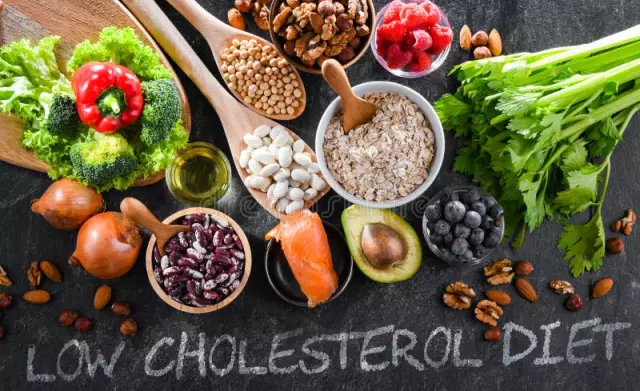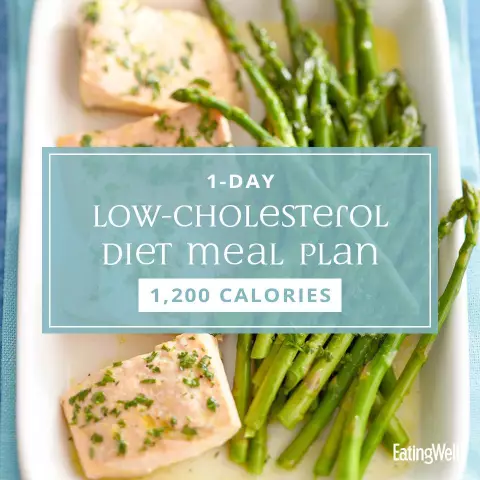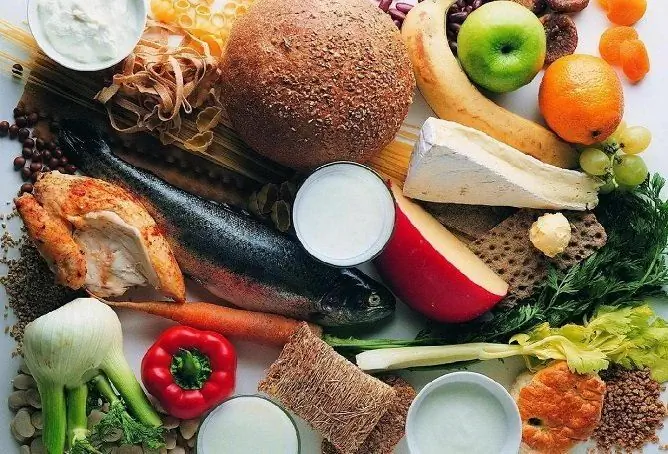- Author Rachel Wainwright wainwright@abchealthonline.com.
- Public 2023-12-15 07:39.
- Last modified 2025-11-02 20:14.
High cholesterol diet

Cholesterol is an organic compound necessary for cell membranes. It promotes the production of vitamin D, female and male sex hormones (estrogens, progesterone and testosterone), and also takes an active part in the functioning of the immune system.
As a result of many studies, a link has been established between cholesterol levels and human health. In particular, with an excess of cholesterol, the risk of developing atherosclerotic disorders and the formation of plaques in the vessels increases significantly, which is the cause of ischemic stroke, heart attack and other cardiovascular complications.
Thus, in order to avoid the development and progression of these diseases, you should follow a diet with high cholesterol.
Cholesterol diet menu
To lower blood cholesterol, the diet should be followed at all times. At the same time, the consumption of saturated fats should be reduced by about one third, which will ensure a sustained reduction in "bad" cholesterol, and will also avoid drug treatment.
When cholesterol is high, the diet should be based on the following:
- Unsaturated fats (vegetable origin) contribute to lowering blood cholesterol;
- Saturated fats (synthetic and animal) raise blood cholesterol;
- Monounsaturated fats (fish and seafood) help normalize cholesterol and triglyceride levels.
Healthy and unhealthy foods to lower cholesterol
When compiling a menu for a cholesterol diet, the following properties of products and their effect on the body should be taken into account:
- Dairy products should only be low-fat (milk - no more than 1.5%, yogurt and kefir - no more than 2%, cheese - 35% and below), while it is recommended to refuse cream and sour cream;
- The consumption of margarine and butter should be significantly reduced;
- From vegetable oils, olive oil should be preferred, as it helps to lower cholesterol levels. Vegetable oils such as peanut, sunflower, corn and soybean oils can be used in small amounts in your diet;
- From meat to lower blood cholesterol for a diet, it is better to choose lean beef, veal and lamb. The fat should be cut off before cooking. Nutritionists do not recommend giving up meat completely, since a complete rejection of red meat can lead to anemia, especially in young women. It is better not to include processed meats such as sausages, sausages and bacon in the diet;
- Byproducts, including kidneys, liver and brains, contain a large amount of "bad" cholesterol, so it is not recommended to use them in a hypocholesterol diet;
- From poultry meat, turkey meat should be preferred, since it contains only 3-5% fat;
- It is recommended to eat fish in a diet with high cholesterol daily. The omega-3 fatty acids contained in it, according to the results of numerous studies, can significantly reduce the risk of developing a heart attack and other cardiovascular complications. The most saturated omega-3 fatty acids are tuna, cod and flounder, while fish and squid caviar, on the contrary, contain a large amount of "bad" cholesterol, and it is not recommended to use them in a hypocholesterol diet;
- Egg yolks contain a lot of cholesterol, so you shouldn't eat more than 3-4 eggs a week with a diet, while egg whites can be eaten without restrictions;
- When 400 g or more vegetables and fruits are consumed in the daily diet, a significant decrease in blood cholesterol levels is observed. The lowest mortality rates from hypertension, ischemia and cancer in Europe are observed in countries where a lot of fruits and vegetables are traditionally eaten. With high cholesterol for the diet, grapes, beets, pumpkins, avocados and eggplants are considered the most useful, since the flavonoids they contain contribute to the elimination of "bad" cholesterol from the body;
- During a diet with blood cholesterol, it is recommended to consume carbohydrate-rich wholemeal bread and pasta. They are not only an alternative source of energy, but also contribute to the binding and elimination of "bad" cholesterol from the body;
- Legumes contain a lot of vegetable protein. Soy, peas and beans should be included in the diet for high cholesterol, especially with limited meat consumption;
- Alcohol in moderate doses helps protect against atherosclerosis, since it reduces blood viscosity and prevents the development of thrombosis;
- Nuts are a source of unsaturated fatty acids. According to many studies, walnuts are especially beneficial for lowering blood cholesterol levels.
With high cholesterol, the diet should eliminate all kinds of sweets, since high blood sugar increases cholesterol.

During a diet with high cholesterol, preference should be given to stewed and boiled food, while it is recommended to stew with a minimum amount of fat and oil, and their lack can be compensated for with water.
In addition to changing your diet to lower the level of "bad" cholesterol in the blood, you should regularly engage in physical activity (morning exercises, walking and sports), stop smoking and reduce alcohol consumption.
You can supplement the diet with high cholesterol with herbal teas from rose hips, corn silk, horsetail, hawthorn, buckthorn, mint and motherwort, which are useful for the prevention and treatment of atherosclerosis.
Approximate daily diet menu for high cholesterol
For the first breakfast with a hypocholesterol diet, you can eat 150 g of buckwheat porridge, one portion of fruit (grapefruit, apple, pear or orange) and drink a glass of coffee or tea without sugar (you can use honey and low-fat milk).
For the second breakfast, we recommend a vegetable salad (250 g), seasoned with lemon juice or olive oil, and a glass of fresh carrot juice.
Lunch includes 300 ml of vegetable soup in olive oil, 150 g of steamed chicken cutlets, 150 g of grilled vegetables, 1 slice of wheat bread and a glass of orange juice.
For an afternoon snack, you can eat 120 g of oatmeal and drink a glass of apple juice.
Dinner includes 200 g of lean grilled fish, 150 g of stewed vegetables, 1 slice of bran bread and a glass of tea (black, green or herbal).
Found a mistake in the text? Select it and press Ctrl + Enter.






